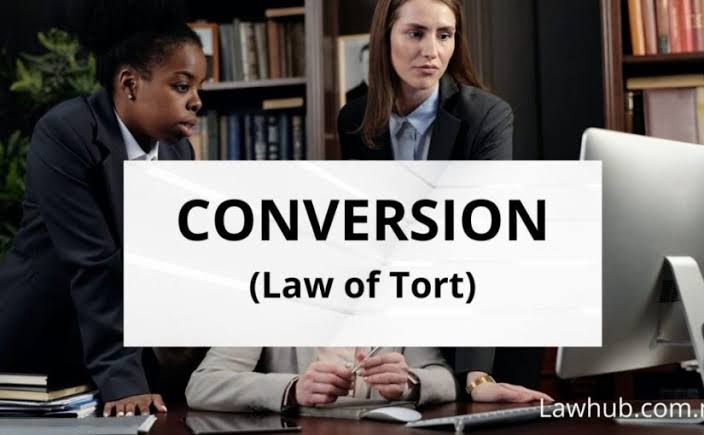N.B. This article is particular to Nigeria.
Conversion
Conversion may be defined as an intentional dealing with or exercise of control over a chattel which seriously interferes with the plaintiff’s right of possession of such chattel.
Conversion is similar to trespass in that it primarily protects possession rather than ownership of goods. It differs from trespass in that:
- In conversion, the interference must be intentional, whereas in trespass, it must be intentional or negligent.
- Unlike in trespass, conversion is not for the plaintiff to have actual possession, it is sufficient he had an imminent right to possession
- It is not conversion merely to move chattel from one place to another but such act would amount to trespass.
INTENTIONAL CONDUCT
A defendant will be liable in conversion only where his conduct in relation to the plaintiff’s goods was intentional. An interference resulting from mere careless conduct is not actionable per se in conversion. To amount to conversion, the intent of the defendant must be to deal with the plaintiff’s goods by exercising Dominion over them on his own behalf or non-behalf of someone other than the plaintiff.
If such intent is present and there is in fact an interference with the plaintiff right over the goods, the defendant would not be liable in conversion.
ACTS OF CONVERSION
- Conversion by taking: it is conversion to take goods without lawful justification out of the possession of the person entitled to them with the intention of exercising a permanent or temporary definition over them. It is essential however that the defendant should have intended to exercise Dominion over the chattel. If he merely removed the chattel from one place to another without intending to assume possession, he will be liable in trespass but not in conversion. An example is seen in the Nigerian case of Davies V. Lagos city council.
- Conversion by destruction: intentionally, to destroy or consume a plaintiff’s chattel constitutes conversion. Merely to damage the chattel of another is not conversion but trespass. In each case it is a question of degree as to whether or not the damage is so great as to amount to destruction. It is also conversion to alter the identity of a chattel.
- Conversion by using: if the defendant uses the plaintiff’s chattel as if it were his own, his act is inconsistent with the right of the plaintiff & he will be liable in conversion. Where the defendant finds the plaintiff chattel, he does not commit conversion merely by keeping it in his possession, but he would be liable if he uses it. This is seen in Petre V. Heneage
- Conversion by detention: where the defendant is in possession of the plaintiff’s chattel without authority & refuses to surrender it to the plaintiff when asked to do so, he commits conversion.
Contributed by: Abdulganiyu Ismail (AKA) Mastermind
Prepared and Written by: Ucheakonam Chijioke Joshua (CJ)


Leave a Reply